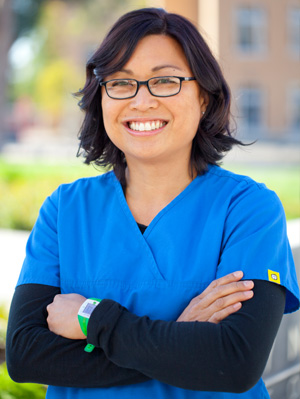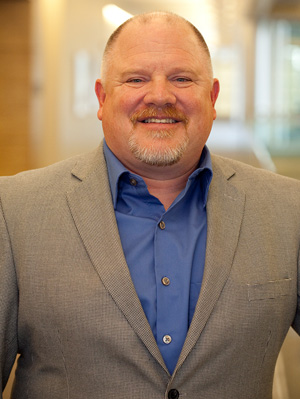Alumni distinction
California's largest hospital provider fosters culture of inquiry

Frances Patmon
As the roles for nurses increase amid the constantly changing state of health care, nurse-led research moves from the back burner to the forefront. Developing a nursing research program at a non-academic large health care system is a novel decision. Yet with the support of nursing administrators and leadership of two doctoral alumni from the Betty Irene Moore School of Nursing at UC Davis, Dignity Health charts a new course to improve care for people and care delivery for nurses.
Nurse scientists Perry Gee and Frances Patmon lead Dignity Health’s Nursing Research and Clinical Informatics program. They focus on improving patient outcomes, fostering a culture of inquiry and guiding decision making based on evidence based practice. While the program is new, Gee’s and Patmon’s connection to the health care organization and each other dates back decades.
“I worked for Catholic Healthcare West, which became Dignity Health, 20 years ago as a health informaticist and I’ve known Frances for years,” recalled Gee, a 2014 Doctor of Philosophy alumnus of the School of Nursing. “Through patient-engagement research, I developed a system for people to self-manage their conditions with a technical twist. I recently published that work and it caught the attention of nursing administrators at Dignity.”
“We know each other’s backgrounds, capabilities and strengths, which is invaluable in the work we’re doing to improve patient outcomes and optimize the experience nurses have with the technology tools,” added Patmon, a former emergency department clinical nurse educator at Dignity Health. “We know that people who are engaged are more apt to be involved with their health care planning, treatment and follow through.”
Patmon came to the School of Nursing with the desire to combine her knowledge from the bedside with broader, systems-level perspectives to spark change. Gee entered with a passion for teaching at the collegiate level, not research. Less than two years after graduation, they now lead a team of five people on rigorous projects that aim to improve care for millions of patients in Dignity’s more than 40 facilities and enhance the bedside experience of the more than 30,000 nurses in the system.
“The voice of the nurse in health care research needs to be stronger, especially as it drives care in community and hospital settings. Original research by nurses does not result in evidenced-based changes in practice as much as it should,” explained Elise Dempsey, vice president of nursing research for Dignity Health. “Our program allows nursing to improve business decision making by providing scientific testing and analysis, as well as contribute knowledge to the overall body of nursing literature.”
Dempsey said the School of Nursing’s research focus on informatics and technology in health care fits well with Dignity’s goal of improving patient engagement through technology.
“We focus at the grass-roots level right now, working with floor nurses and their patients figuring out how to best use these technological interventions,” Gee said. “Ultimately, we’ve got to change the culture within health systems and get people to value this research and value the evidence. Not just at Dignity Health, but for the three million nurses nationwide.”

Perry Gee
“Our doctoral program at the School of Nursing provided us the basics of research methodology and the foundation of networking, so we can collaborate with some of the greatest researchers in the field,” Patmon explained. “Ultimately, I want our patients to improve and bedside nurses to embrace research and the idea of advanced education.”
“We want to get all nurses ― from bedside to the chief nursing executive ― involved with research, teaching them techniques along the way and reinforcing what they learned in nursing school,” Gee added. “Our former classmates can’t believe we get to work together. This is an amazing experience and we are very thankful to be here.”





